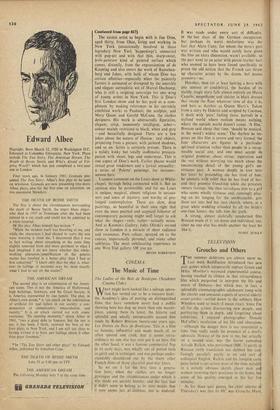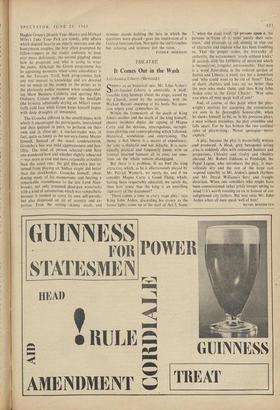TELEVISION
Groucho and Others
THE summer doldrums are almost upon us. Last week Rediffusion introduced two new quiz games which temporarily replace Green and Miles. Monitor's •wayward experimental course, having reached its climax in that extraordinary film which purported to interpret the life and music of Debussy---but which was, in fact, a splendidly cinematographic adolescent romp with the sinister and sensuous aspects of several elderly avant-gardes—settled down to the subjects Huw Wheldon used to teach (I mean treat). Since I'm all for the screen discovering new people, and portraying them in depth, and forgetting about celebrities, I enjoyed photographer Donald McCullin's revelation of his life and obsessions —although the danger here is too reverential a tone. One really needs the presence of a devil'. advocate. Newest of the new to me, but actually on a second• visit, was the Soviet comedian Arkady Raikin, who performed (BBC-2) partly in Russian (with translation not dubbed but co fusingly parallel), partly in an odd sort colloquial English. Raikin and his lumpish co pany failed to get across most of the time, notabl in a naïvely obvious sketch about men and women reversing their positions in the home, bUt some of his quality emerged in the last fe* minutes. ' As for those quiz games., the chief interest oi ThUrsday's was that its MC was Grouch() Marx. Hughie Green's Double Your Money and Michael Miles's Take Your Pick are rowdy, jolly affairs which depend heavily on elderly matrons and shy honeymoon couples, the first often prompted by fellow-trippers in the studio audience to ham ever more deliriously, the second giggling about how he proposed and who is going to wear the pants. Although the Green programme has its agonising moments when some auto-didact is on the Treasure Trail, both programmes lack any real interest in knowledge and are devoted not so much to the money or the prizes as to the gloriously public moment when condescend- ing, Show Business Celebrity and sporting Mrs. Ordinary Citizen embrace under the limelight (the hysteria admittedly drying on Miles's essen- tially cold face while Green keeps himself happy with deep draughts of innuendo).
The Groucho differed in the unselfishness with which it encouraged the participants, interviewed and then quizzed in pairs, to perform on their own and in close-up: a market-trader was, in fact, quite as funny as the not-very-funny Master himself. Instead of the usual condescension, Groucho's line was mild aggressiveness and hos- tility. The kind of person selected—and here one wondered how and whether slightly rehearsed —was more at ease and more rationally articulate than the usual run: the girl film-extra just re- turned from playing an `Indian virgin' did better than the stockbroker. Groucho himself, aban- doning many of his mannerisms and bearing a remarkable resemblance to the late Lord Alan- , brooke, not only streamed dead-pan wisecracks with a kind of automatism which was sympathetic because it seemed to carry its own self-parody, but also dispensed an air of serenity and ex- pertise. Even the setting—skinny stools and skinnier stands holding the hats in which the questions were placed—gave the impression of a farcical functionalism. Not quite the old Groucho, but relaxing and intimate just the same.
PATRICK ANDERSON







































 Previous page
Previous page